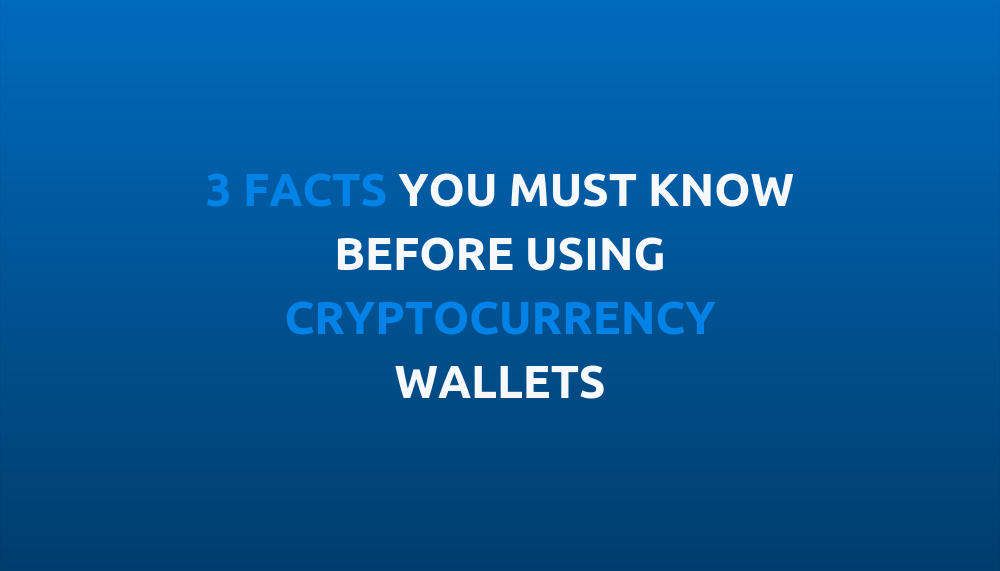3 Facts You Must Know Before Using Cryptocurrency Wallets
Whether we like it or not – sooner or later, our future will be all about IoT and blockchain technologies, and the smart society that is built on these technologies. It’s about time to realize that we won’t be able to do much without an intimate understanding of the technologies.
In order to understand blockchain, it is critical to understand how the blockchain wallet works. However, the word ‘wallet’ seems to confuse people from understanding what blockchain wallet really is. Let’s first have a look at the simple misunderstandings of the blockchain wallet.
1. Do blockchain wallets store money in the wallet?
A wallet in our day to day lives means an object that stores bills and cards, therefore, it reminds of us the physical wallet (storage) in our pockets that may or may not store cryptocurrencies.
However, no cryptocurrency wallet actually hold cryptocurrencies. Blockchain wallet only exists to store your private key, which creates transaction data and signatures, just like a tool. Maybe a cryptocurrency ‘key chain’ makes more sense than a wallet in this case.

Then the question here is, where are the cryptocurrencies that we believed were stored inside the wallet? The answer is blockchain. What if someone loses the key that was stored in the wallet? It doesn’t necessarily mean that the assets will be lost, but because of the key, it means the person cannot prove those assets are actually his/hers.
Therefore the most important thing when it comes to cryptocurrency wallet management is actually key management. A cryptocurrency wallet is a tool that manages the keys.
Fact 1: Cryptocurrency wallets store keys.
2. Cryptocurrency Wallet is Private?
It seems like cryptocurrency wallets should be something private (in other words, personal) – There are other wallets that are made for ‘Things’. This is the base technology of the coming ‘Blockchain + IoT = BIoT’ era. In the BIoT era, ‘things’ are interconnected with each other by communicating via payment of things, which leads to building a smart society.
Also, it doesn’t mean that one thing can only hold one wallet, but even a few. Let’s take vehicles, perhaps a car, as an example.

It’s a battlefield of different patents inside a car (vehicle). We wish each component could communicate with each other for better efficiency, but that’s not possible due to each patent they hold. Therefore each component can only communicate via exchanging information. As a result, even inside one single vehicle, there are numerous wallets that help exchange information.
Regardless of the conclusion, the compromises, there must be various types of ‘things’ wallets in order to let the exchange of information go as smoothly as possible. Of course, all ‘things’ are under the control of the users.
Fact 2: In the era of BIoT, there are wallets for ‘things’ that allow authentication and payments.
3. Wallets Must Be Kept in Pockets?
This also only applies to individual users – and of course, wallets for enterprises also exist as we know it. They’re usually appliance-type wallets since it needs to be loaded with more complicated features.
It is sometimes called ‘Blockchain KMS (Key Management System)’ or ‘Key Custody Server’, however, the bottom line is that they’re still cryptocurrency wallets. Enterprise wallet is a must-have tool for enterprises in order to manage ‘blockchain fintech service’ in addition to cryptocurrency trades.

Blockchain fintech service means providing financial services via blockchain, just like how the internet and mobile banking work these days. It not only solves key management risks and burdens of individual users but also provides the utmost security for asset custody and services.
Therefore enterprise wallets should not be just a pile of individual wallets, but must overcome and accomplish enterprise-level scale and security for safe key management. Cold wallets can also help with the enhancement.
Fact 3: There are enterprise-level wallets for blockchain fintech services.
